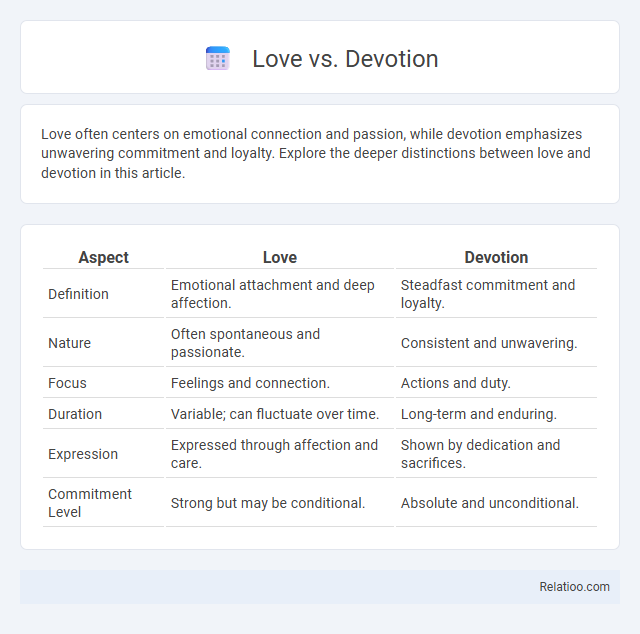Love often centers on emotional connection and passion, while devotion emphasizes unwavering commitment and loyalty. Explore the deeper distinctions between love and devotion in this article.
Table of Comparison
| Aspect | Love | Devotion |
|---|---|---|
| Definition | Emotional attachment and deep affection. | Steadfast commitment and loyalty. |
| Nature | Often spontaneous and passionate. | Consistent and unwavering. |
| Focus | Feelings and connection. | Actions and duty. |
| Duration | Variable; can fluctuate over time. | Long-term and enduring. |
| Expression | Expressed through affection and care. | Shown by dedication and sacrifices. |
| Commitment Level | Strong but may be conditional. | Absolute and unconditional. |
Understanding the Essence of Love
Love embodies a complex emotional connection characterized by affection, care, and deep attachment, while devotion emphasizes unwavering loyalty and commitment to a person or cause. Understanding the essence of love involves recognizing its multifaceted nature, where emotional intimacy and selfless dedication coexist. Exploring psychological theories and cultural perspectives reveals that love's core integrates empathy, trust, and a profound sense of belonging.
Defining Devotion: Beyond Affection
Devotion transcends mere affection by embodying unwavering commitment and deep loyalty that persists through challenges and time. Unlike fleeting feelings of love, devotion involves consistent actions that prioritize the well-being and growth of the beloved. This steadfast dedication creates a foundation of trust and resilience that sustains relationships beyond emotional attraction.
Key Differences Between Love and Devotion
Love involves deep emotional connection and affection, often characterized by passion and romantic feelings, while devotion emphasizes unwavering loyalty and commitment, frequently manifesting as selfless dedication and service. Love tends to be more dynamic and can fluctuate with circumstances, whereas devotion is steadier, rooted in a consistent sense of duty and allegiance. Understanding these distinctions highlights how love engages the heart emotionally, whereas devotion anchors the spirit to persistent, purposeful allegiance.
How Love Influences Relationships
Love deeply impacts your relationships by fostering emotional connection, trust, and intimacy, creating a foundation for long-lasting bonds. Devotion offers commitment and loyalty, strengthening the relationship through consistent support and shared values. Balancing love and devotion ensures mutual understanding and resilience during challenges.
The Role of Devotion in Commitment
Devotion plays a crucial role in commitment by fostering unwavering loyalty and a deep emotional bond that transcends fleeting feelings of love. Unlike love, which can be influenced by changing emotions, devotion is characterized by consistent dedication and selfless support, strengthening the foundation of long-term relationships. This steadfast commitment ensures resilience during challenges, making devotion indispensable for enduring partnership success.
Emotional Depth: Love Versus Devotion
Love embodies a profound emotional connection characterized by passion, vulnerability, and a dynamic exchange of feelings, often marked by both joy and pain. Devotion signifies a steadfast commitment and loyalty that transcends fleeting emotions, reflecting a deep-seated dedication rooted in respect and duty. While love fluctuates with emotional intensity, devotion offers unwavering stability, highlighting their distinct emotional depths in human relationships.
Can Love Exist Without Devotion?
Love can exist without devotion in its initial stages, characterized by emotional attraction and passion without long-term commitment. Devotion involves consistent loyalty and selfless dedication, transforming love into a stable and enduring bond. While love ignites connection, devotion sustains and deepens that connection through ongoing care and sacrifice.
Signs of True Devotion in a Relationship
True devotion in a relationship is characterized by unwavering commitment, consistent support, and selfless actions that prioritize Your partner's well-being over personal desires. Signs of true devotion include patience during difficult times, honest communication without judgment, and a willingness to grow together through challenges. This deep connection fosters trust and emotional security, distinguishing genuine devotion from fleeting affection or superficial love.
Achieving Balance: Nurturing Love and Devotion
Achieving balance between love and devotion requires recognizing that love nurtures emotional connection while devotion fuels commitment and perseverance. Your ability to harmonize these elements fosters a relationship grounded in both heartfelt affection and unwavering loyalty. Cultivating this equilibrium enhances trust, deepens intimacy, and sustains long-term relational fulfillment.
Choosing Between Love and Devotion: What Matters Most?
Choosing between love and devotion requires understanding their distinct qualities: love is an emotional connection characterized by passion and affection, while devotion embodies unwavering loyalty and commitment. Prioritizing love often emphasizes emotional fulfillment and intimacy, whereas valuing devotion highlights trust, consistency, and long-term reliability. The most important factor depends on individual relationship goals, where balancing both elements can create a harmonious and enduring bond.

Infographic: Love vs Devotion
 relatioo.com
relatioo.com